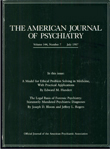Lithium prophylaxis of depression in unipolar, bipolar II, and cyclothymic patients
Abstract
The authors assessed lithium's prophylactic effect against depression in unipolar (N = 43), bipolar II (N = 102), and cyclothymic (N = 69) patients using a longitudinal life-table analysis and calculated the probability of remaining free of a depressive episode. The probability of remaining free of one depressive episode after 2 years of taking lithium ranged from 42% to 55% for the bipolar II patients, 31% to 42% for the unipolar patients, and 26% to 36% for the cyclothymic patients. The average probability of suffering one depressive episode severe enough to require either pharmacologic intervention or hospitalization in a 2-year period was 51% for the bipolar II patients, 64% for the unipolar patients, and 69% for the cyclothymic patients.
Access content
To read the fulltext, please use one of the options below to sign in or purchase access.- Personal login
- Institutional Login
- Sign in via OpenAthens
- Register for access
-
Please login/register if you wish to pair your device and check access availability.
Not a subscriber?
PsychiatryOnline subscription options offer access to the DSM-5 library, books, journals, CME, and patient resources. This all-in-one virtual library provides psychiatrists and mental health professionals with key resources for diagnosis, treatment, research, and professional development.
Need more help? PsychiatryOnline Customer Service may be reached by emailing [email protected] or by calling 800-368-5777 (in the U.S.) or 703-907-7322 (outside the U.S.).



